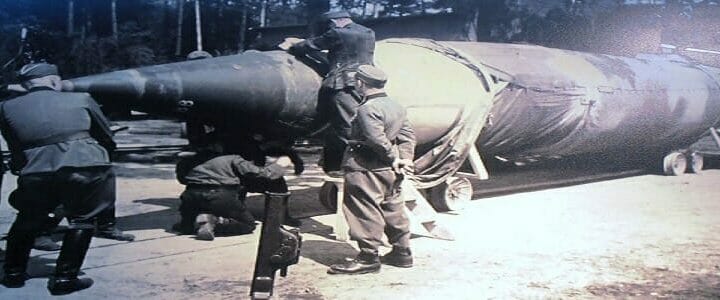Perhaps the greatest German classified effort of the Second World War was the development of ‘secret V-weapons’. These were the Vergeltung – Revenge – rocket series. The V-1 cruise missile became known as the Buzz Bomb because of its sound as it flew toward a target. The V-2 was different. It blasted faster than sound out of the atmosphere, appearing only as a tremendous explosion when it hit a city. No siren warned those about to die.
How was all this compromised, and why would a modern clearance holder care? A host of authors have speculated on how the revenge rocket was uncovered. One cites a French female spy whose work as a translator for industrialists eventually allowed her to overhear her German employers speaking freely. They mentioned an intriguing project they were undertaking at a test field far away on the Baltic coast. The French translator’s presence was so pleasant– but inconsequential to the German mind– that they introduced her to other colleagues working on the project. These colleagues also offered their opinions freely in this woman’s presence. She was, after all, a functionary they considered beneath them. She was harmless. She played her part well, and speculated the project would go nowhere, since rockets were purely fiction. Not to be outdone by a mere woman translator, one German businessman said, `I’ll show you. It’s here!’ Not only did his document reveal the design, but also how one accessed the secret base, showing passes and their characteristics for entry. Sad for German plans, the ‘inconsequential’ spy had a photographic memory.
Spy Secret: Never Forget Where You Are and Who You’re With
All too often those who hold secrets forget where they are. Spies never do. Have you read the recent reports of the bugged rooms in hotels or in airports? Perhaps you too discuss your projects, or don’t protect your screens from inconsequential office visitors? A multi-million dollar classified program is worth spending the time giving everyone—even those remotely associated with a project— a careful look. But don’t just stop at those who have physical access..
Another report about the secret V-weapons came from a Polish farmer. His information revealed that whole stretches of a Peenemunde beach were now off limits to fishing, farming, and even visiting. London was intrigued. No secret had been betrayed, but the secrecy of the site led the British to inquire further. In time, confirmation of a secret rocket development program came from returning prisoners and refugees from the same district, from overheard conversations, and then from photographic missions.
All of this tells us today we are being watched. Americans like to battle adversaries we feel at ease with. We are hyper-alert nowadays to international cyber theft. We know what to check for against hackers, pfishing operations, and a host of other schemes to get our electronic information. We see it, and report such information to our security managers. But what about our uncontrolled clues that could reveal more?
Are we aware of these other means of collection? As the French spy mentioned, her German colleagues considered her ‘part of the furniture.’ Her place as a woman, and so her abilities, were considered insignificant in their world view. Polish farmers were subhumans, and not to be worried about. Yet because of these unsuspected people, the whole V-Program was compromised.
Causal discussions of projects must only to be held in cleared, classified chambers. Instead of these cleared areas, we like to talk shop in restaurants, hotels, and airports. (This isn’t a new problem – even in 1940’s occupied Europe the Germans set aside special rooms for classified discussions, but they preferred Bistros and chic restaurants instead.)
With all of the defensive measures of secure rooms, classified conference facilities, and so forth, why can’t we protect things better? We hear “need-to-know” preached at every security class, and tend to obey that idea among peers. But do we even see those who ‘are like furniture’? Does our company have a program to vet our cleaning staff, remind travelers of the dangers of hotel staff, or even to report those wandering near our protected sites? A spy these days certainly employs electronics, but he doesn’t forget methods which have, and will always work because we simply don’t pay attention. There is nowhere that is safe, if we don’t use the protocols established to protect our data and discussions. Who are the people who clean up after your day is done, or who might listen in while they work, as you and a colleague talk? Talk to your security manager. If you don’t know the policy, it’s time to create one




